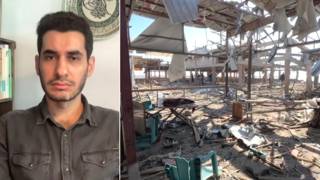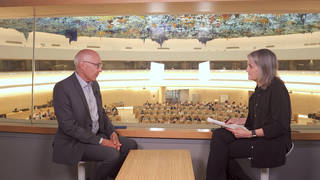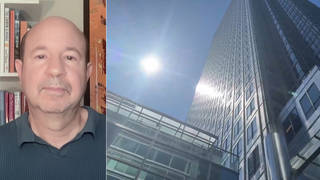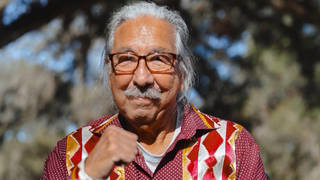
The United American Indians of New England marked the 42nd National Day of Mourning in Plymouth, Mass. on Nov. 24 as others celebrated the Thanksgiving holiday. Native speakers described the “suppressed” history of the holiday, the massacre of the Wampanoag and other indigenous peoples, and their continued discrimination. They also expressed solidarity with struggles around the world, from Palestine to the Occupy Movement. The speeches were followed by a march through the town of Plymouth, and a potluck social. Democracy Now! was there.
MOONANUM JAMES: In 1970, United American Indians of New England declared the U.S. Thanksgiving day to be a national day of mourning, and this came about as a result of the suppression of the truth. So, what is the real truth about the first Thanksgiving? According to popular myth the Indians and the Pilgrims, who were the best of pals, sat down and had a wonderful dinner to enjoy the Pilgrims bountiful harvest. Everyone lived happily ever after, the end. About the only true thing in the whole mythology is that these pitiful Europeans strangers would not have survived their first several years in New England, were it not for the aid of the Wampanoag people. What Native people got in return for this help, was genocide, the theft of our lands and never ending repression. Today, as we did in 1970, we mourn the loss of millions of our ancestors and the devastation of our beautiful land and water and air.
MAHTOWIN MUNROE: We welcome people who have been coming here for 42 years, and we welcome people who are here for the first time, and I had better not forget to welcome those of you who have come from Occupy Decolonize Boston and Occupy Wall Street and from Occupy the Hood and Ocupamos del Barrio.
MARTIN DAGOBERTO: People in the Occupy movement need to realize that Indigenous solidarity and Indigenous issues is not just another side issue or interest that is tangent to what we’re trying to do, it is foundational, it is completely central to what we’re doing. Indigenous people have been resisting the systems of oppression connecting capitalism to colonialism since it first arrived here and they have the most to share on how we need to resist it. Further, we’ve lost track of the original instructions on how to live sustainably on this earth. And if we’re going to create a truly just and sustainable society that works for everyone including the earth, we need to have representation of native voices.
PROTESTER: Free Mumia, free Peltier. Free Mumia, free Peltier.
PROTESTER: No justice, no peace.
CROWD: No justice, no peace.
PROTESTER: No justice, no peace.
CROWD: No justice, no peace.
JUAN GONZALEZ: We need to settle, once and for all, our illegal immigrant status in Unites States. Don’t you remember that we have inhabited this continent for 100,000 years. Don’t you remember that. So, we challenge the United States Government, we challenge the politicians, we challenge the people of the United States to honor the true history of this sacred land.
PROTESTER: No justice, no peace. Who’s streets…?
CROWD: Our streets.
PROTESTER: No justice…
CROWD: No peace…
STEPHEN MARTIN: You know history is really the story of conquerors. But, there’s always another side of history; there’s the story of the conquered, and it’s no less true, no less real. And so, I think people need to look behind the myths and the lies that we’ve been taught and that our children are being taught in school.
PROTESTER: What do we want…?
CROWD: Justice.
PROTESTER: When do we want it…?
CROWD: Now.
TIOKASIN GHOSTHORSE: Americans need to look at their denial, whether or not they do anything about it is not up to me. We can only show what we have been through and continue to do that without trying to complain about everything. If we were to be listened to, finally, I think that this country and the peoples will turn. We’re not asking people to go back to where they came from, we’re asking them to finally change their minds and their hearts.
MOONANUM JAMES: I hope that next year, on the 43rd National Day of Mourning, we do not have to chant “free Leneord Peltier” on the streets, that we do not have to chant “free Mumia Abu-Jamal.”
TRISHA MAH: I came here just because, like, it’s definitely a space to really learn a lot about the real history of this country, and being someone who’s family came here because it was supposed to be a land of opportunity and stuff. So, it was really interesting to learn.
LUIS RODRIGUEZ: I came here because I didn’t know much of the history about Thanksgiving. I only knew what I learned in school. Clearly, it was very wrong and it was just like—-knowledge is key and I think coming here taught me a lot.
LINDA CLARK: I think coming here dispels a lot of myths about Plymouth Rock and about the story about Thanksgiving. I think that we need to know the truth, that the history is much more than that, it’s much deeper, the relationships are much more significant. If they were violent, they were violent. If they were friendly at time, they were friendly. But, we need to know those things so that we can continue to repair the wrongs and continue to forge a strong nation instead of a divided nation where people don’t want to talk about things like racism. They don’t want to talk about homelessness. They don’t want to talk about the state that the indigenous people are in today.












Media Options